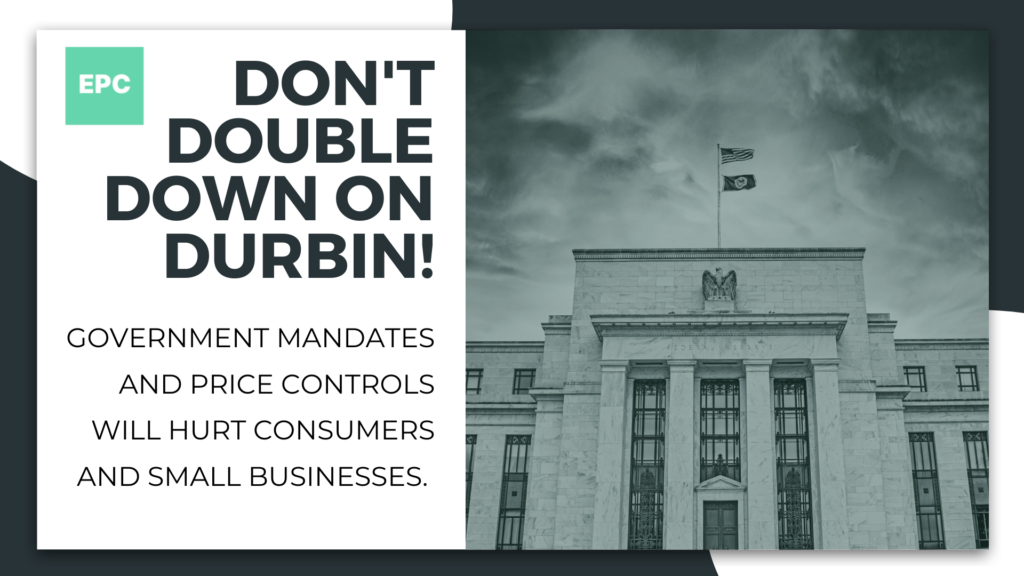Government mandates and price controls will hurt consumers and small businesses.

The 2010 Durbin Amendment has been a disaster for consumers, but mega-stores like Walmart, Target, and Amazon want the Federal Reserve to make things even worse. Their plan to tighten price caps will make checking account and debit card fees go up. Tell the Fed NO!
Click HERE to take action and urge the Fed to oppose further rate caps on debit Interchange.
Fast Facts About the 2010 Durbin Amendment (Durbin 1.0):
- Merchants did not – and will not – decrease prices. Following the cap on debit interchange, a Richmond Fed study showed 98 percent of retailers either failed to reduce prices or actually raised them.
- Small banks were not exempt from the impact of Durbin 1.0 and paid a heavy price. Data from the Federal Reserve clearly shows that, despite so-called exemptions for community banks and credit unions, interchange revenue for these entities has decreased. Additionally, the exemption was not adjusted for inflation so the banks impacted by these restrictions are now smaller than originally intended back in 2011.
- Debit interchange caps increased the number of unbanked Americans and credit card routing mandates would disproportionately impact LMI households. A paper from 2022 found, “the growth in the recently unbanked (those who had accounts previously but closed them within the last year) is also highest in states with the most” banks impacted by Durbin 1.0. An economist estimated “lower-income and low credit households would lose $434 million, close to 22% of the cost borne” should Durbin 1.0 regulations be applied to credit cards.
Click HERE to learn more about how you can speak out against the Durbin Amendment
Fast Facts About the Durbin Credit Card Interchange Legislation (Durbin 2.0):
- Credit card interchange has not increased since 2016. Interchange has not increased a fraction of a percent since 2016 when it went on average from 1.7% to 1.8%. The year after that increase, the NFIB said credit card acceptance was “relatively inexpensive, considering what it delivers” and that “credit card processing is a competitive industry … The increase in sales that a business realizes when they start accepting credit cards will typically more than make up for their processing fees, so they come out ahead.” The only reason a merchant would pay more is because his or her revenue went up directly proportionate to the increase.
- Credit card processing is not the second highest expense businesses face. Forbes Advisor cites labor cost as approximately 70% of a business’s budget and inventory accounting for 17%-25%. In a 2020 study by the NFIB, the top expense-associated problems for small businesses include health insurance, taxes, cost of inventory and liability insurance. Credit card fees were not even included. This study went on to say, “the proliferation of credit cards has alleviated many payment problems previously faced by small-business owners.”
- Small businesses are unlikely to see any savings. Many small businesses use payment processors like Toast or Square. Despite the government cap on debit interchange, these platforms often charge small businesses the same fee whether a customer uses debit or credit cards – essentially, the Durbin 1.0 caps never made it to small businesses.
More Updates
More Than 175 Organizations Oppose the Durbin Credit Card Interchange Bill
Electronic Payments Coalition
Read
Press Releases / Statements
American Banker Op-ed: Merchants shouldn’t count on the CCCA to meaningfully lower their costs
American Banker
Read
Las Cruces Sun News: Federal government shouldn’t dictate credit card fees
Las Cruces Sun News
Read